Online editor Davina Shum reports back from four sessions in Edinburgh, where artists displayed their superpowers to bring people together and offer much-needed musical nourishment
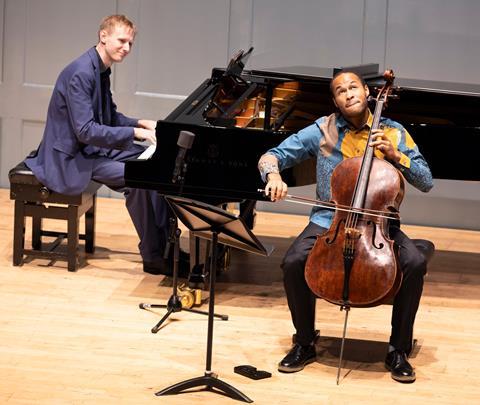
Discover more Featured Stories like this in The Strad Playing Hub
This week, I managed to escape the scorching heatwave of London and spent two days up in the Scottish capital, enjoying the cultural treats of the Edinburgh International Festival (EIF).
Now in its second year under the artistic directorship of violinist Nicola Benedetti, the EIF holds a huge range of events including opera, contemporary music, classical music, dance and theatre. Following from 2023’s theme of ‘Where do we go from here?’ this year’s festival, held from 2 to 25 August, focuses on the theme of community, in ‘Rituals that unite us.’ Fitting, given that it can feel easy to dissociate from tales of tragedy constantly occurring around the world and in our wider society. How can artists use their skills to bring people together during troubled times?
My first concert brought me to Queen’s Hall, where cellist Sheku Kanneh-Mason and pianist Harry Baker presented a recital programme united by the works of Bach. With such a broad remit, the duo explored works that at times, took me by surprise, but in an eclectic way that illustrated the legendary composer’s enduring influence on a diverse set of works. I heard Sour Flower, a work by La Havas arranged by Kanneh-Mason and Baker, followed by folksongs and Pohádka by Janáček, the pair displaying seamless melding of timbres, particularly in Kanneh-Mason’s lively pizzicato and Baker’s low notes. In works by Bill Evans, Pat Metheny and Laura Mvula, the pair embodied the improvisatory nature of other instruments – at times a jazz guitar, or a double bass with a walking bass line – with Kanneh-Mason bopping his head and jiggling his knee as if he were at Ronnie Scott’s, a top London jazz club.
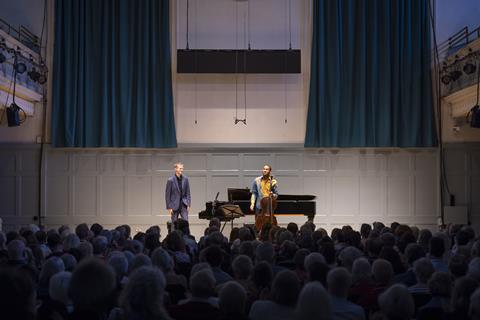
I was struck by the versatility of the duo not only in their playing, but as their skills as arrangers and composers. Kanneh-Mason introduced a collaborative Prelude and Fugue where he had written the Prelude, while Baker wrote the Fugue. ‘The Prelude is in E minor and the fugue is in E major, in case that’s of interest,’ he added, slightly randomly, and to giggles of the audience. The composition had a distinct flavour of Shostakovich, unsurprising given Kanneh-Mason’s known love for the composer. Baker presented his composition I call to you, based on the Bach cantata of the same name, and flexed his arranging muscles with an impressive transcription of Bach’s Prelude and Fugue in D flat major – Kanneh-Mason making easy work of a key that is usually regarded with trepidation from string players.
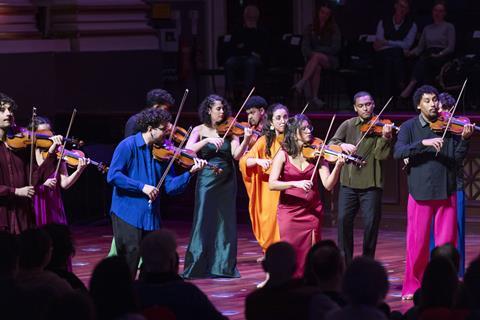
My afternoon and evening were dedicated to Ilumina, a São Paulo-based ensemble founded by violist Jennifer Stumm on the principles of community. The afternoon session served as an introduction to the ensemble and its ethos, narrated by Stumm and interspersed with excerpts of pieces that would be performed in concert in the evening session. Stumm highlighted the merits of inclusivity, diversity and equal opportunity throughout her narration, and in conversation with her the following morning, she spoke to me about the ensemble serving as a symbiotic eco-system, rather than the traditional hierarchy found in existing arts organisations.
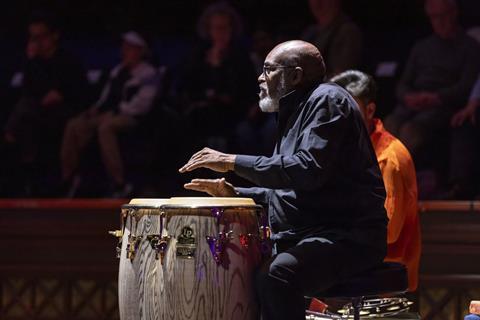
The performance that evening by Ilumina was unlike any other concert I’d attended before – the musicians, dressed in bright block colours, drifted onto a darkened setting, a nod to the concert’s title, ‘In the light of shadow.’ Instead of appearing on the Usher Hall stage, the ensemble took its place in the front of the stalls, vacated of its usual seating and instead replaced with a sea of comfortable bean bags! It was the first time I’d witnessed the French baroque music of Lully performed with the musicians dancing around barefoot, as well as improvisations of various Brazilian rhythms – notably between percussionist Edmundo Carneiro on a berimbau (a single-stringed bow attached to a gourd resonator) and cellist Bruno Lima in a highly animated musical conversation.
The programme provided plenty of gear shifts from these improvisations to Western classical repertoire, including the Prelude to Wagner’s Tristan and Isolde, the final movement of Beethoven’s String Quartet op.131 (both very impressively performed entirely by memory), plus an appearance from violinist Alina Ibragimova in a performance of Mozart’s Sinfonia concertante with Stumm. The ensemble injected a distinct energy into the performances of these staple works of repertoire – evident in the musicians’ inherent listening skills, inner musicality, and openness of interaction to their peers. I couldn’t help but smile when I witnessed two violinists at the back of the firsts grin at each other, eyebrows raised playfully, as they tapered off a phrase together during the Mozart.
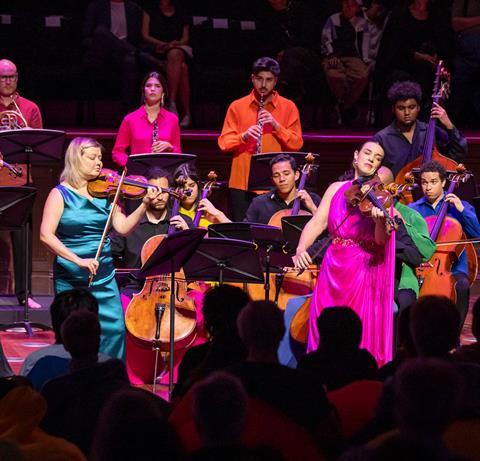
The following evening, Usher Hall was transformed into a 17th-century tavern (though the bean bags remained) with The Alehouse Sessions from the Norwegian-based ensemble, Barokksolistene. I was looking forward to this concert, having listened to the eponymous 2017 album numerous times and even interviewing the ensemble’s artistic director, Bjarte Eike, in 2022, but this would be my first time seeing the group live.
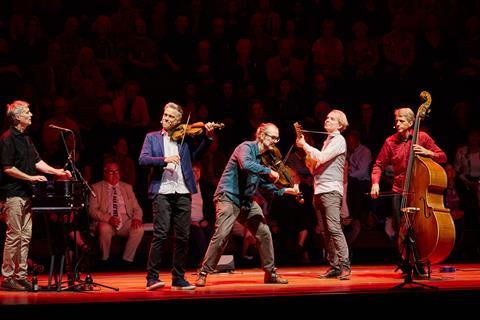
‘What a fantastic pub this is!’ proclaimed Eike, as he gave a brief history of the music to be performed that evening – music during the Puritan times of Oliver Cromwell, during the decade when England was a republic before the restoration of the monarchy in King Charles II in 1660. Tunes such as The Irish Washerwoman, The Virgin Queen from John Playford’s The English Dancing Master featured, as well as hilarious theatrical hijinks interspersed with humour and jokes about political chaos (both historical and topical), while Eike and his band mates swigged bottles of beer on stage. This tavern vibe incited a clap-along and singalong many times throughout the night, as the men on stage performed works that resonated with the Scottish audience – in addition to plenty of localised jokes, often at the expense of neighbouring city Glasgow.
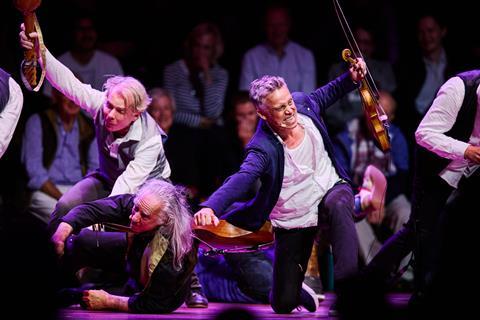
After the last two days, do I feel the music lived up to the theme, ‘Rituals that unite us’? Absolutely. It’s hard not to when you’re surrounded by hundreds of fellow concertgoers, ears open to the surprises and quirks of repertoire – both familiar and unfamiliar – delivered in new and creative ways. It’s environments such as this when you feel like it’s the centre of the world – even though I travelled up alone, I managed to run into three people I knew who were also attending the festival.
I left Edinburgh with a re-energised thrill of being astonished by live music – as well as a wish for a bean bag.
TL;DR? Check out our Instagram reel of EIF here:
Read: ‘I can’t help having a different perspective’ - Violinist Nicola Benedetti
Read: When it rains, it pours: what do you do when your instrument gets drenched?
Discover more Featured Stories like this in The Strad Playing Hub
The number one source for playing and teaching books, guides, CDs, calendars and back issues of the magazine.
In The Best of Technique you’ll discover the top playing tips of the world’s leading string players and teachers. It’s packed full of exercises for students, plus examples from the standard repertoire to show you how to integrate the technique into your playing.
The Strad’s Masterclass series brings together the finest string players with some of the greatest string works ever written. Always one of our most popular sections, Masterclass has been an invaluable aid to aspiring soloists, chamber musicians and string teachers since the 1990s.
American collector David L. Fulton amassed one of the 20th century’s finest collections of stringed instruments. This year’s calendar pays tribute to some of these priceless treasures, including Yehudi Menuhin’s celebrated ‘Lord Wilton’ Guarneri, the Carlo Bergonzi once played by Fritz Kreisler, and four instruments by Antonio Stradivari.













































No comments yet